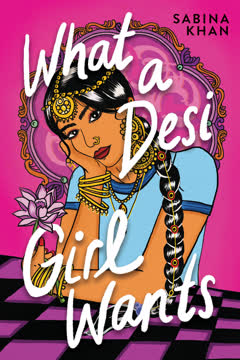Plot Summary
Kansas to Royalty Shock
Mehar, a sharp-tongued, Indian-American teen in Kansas, discovers via Instagram that her estranged father, a nawab in Agra, is engaged to a glamorous socialite, Naz. The news, delivered through her soon-to-be stepsister Aleena's post, stings deeply. Mehar's life with her single mother is simple and close-knit, but the revelation of her father's new life—one of palaces, titles, and opulence—throws her into emotional turmoil. She grapples with feelings of abandonment, jealousy, and anger, questioning her place in her father's world and fearing she's being replaced. The chapter sets the stage for Mehar's internal conflict: a longing for connection with her father, mixed with resentment and suspicion toward his new family.
Estranged Invitations Arrive
A formal wedding invitation arrives, forcing Mehar and her mother to confront the reality of her father's impending marriage. Mehar's mother, pragmatic and loving, encourages her to go, citing her grandmother's declining health and the importance of family ties. Mehar's best friend Norah pushes her to see the opportunity as an adventure, but Mehar is torn between curiosity and dread. The invitation becomes a symbol of everything unresolved: her fractured relationship with her father, her mother's sacrifices, and her own dual heritage and identity as both American and Indian. The decision to attend is fraught with anxiety, hope, and the fear of being an outsider in her own family.
Mother-Daughter Truths
As Mehar prepares for her journey, she and her mother share candid conversations about the past. Her mother reveals the suffocating traditions and expectations she faced in India, the pain of leaving her husband, and the guilt of uprooting Mehar. These revelations deepen Mehar's understanding of her mother's choices and the complexities of love, duty, and cultural identity. The chapter is rich with emotional honesty, as Mehar realizes that her mother's strength and vulnerability are intertwined. The bond between them is tested but ultimately strengthened, providing Mehar with the courage to face her father and the unknowns ahead.
Journey to Agra
Mehar's journey from Kansas to Agra is both physical and emotional. The long, exhausting flight is filled with anxiety about reunions and first impressions. Upon arrival, she is thrust into the chaos of Indian airports, paparazzi, and the overwhelming presence of Aleena, who is both dazzling and intimidating. The drive to the palace is a sensory overload—Delhi's traffic, the contrast between wealth and poverty, and the looming grandeur of her ancestral home. Mehar's feelings oscillate between awe, alienation, and nostalgia, as childhood memories resurface and the reality of her father's world becomes tangible.
Palace of Memories
Entering the palace, Mehar is greeted by a flurry of relatives, staff, and traditions she barely remembers. Her childhood room, preserved like a shrine, evokes bittersweet memories of a life interrupted. The opulence of the palace is both enchanting and alienating, highlighting the gulf between her American upbringing and her Indian heritage. Mehar's grandmother, Dadi, is both loving and formidable, embodying the weight of family expectations. The palace becomes a character in itself—a place of history, secrets, and unresolved tensions. Mehar's sense of belonging is fragile, as she navigates the roles of guest, daughter, and potential heir.
Family Reunions and Tensions
The extended family gathers, each member bringing their own baggage and expectations. Mehar's father, Reza, is affectionate but distracted, torn between his duties and his desire to reconnect. Aunts and cousins range from welcoming to passive-aggressive, with Faiza Phuppi's sharp tongue and Azra Aunty's warmth providing contrasting models of family. Mehar's insecurities are heightened by comparisons to Aleena, who seems to fit effortlessly into the world Mehar left behind. The chapter explores the complexities of family loyalty, rivalry, and the longing for acceptance, as Mehar struggles to find her place in the intricate web of relationships.
Navigating New Alliances
Mehar's interactions with Aleena are fraught with competition and misunderstanding. Aleena's social media savvy and confidence mask her own vulnerabilities, while Mehar's sarcasm is a shield against feeling out of place. The arrival of Sufiya, Dadi's assistant, introduces a new dynamic—her quiet strength and empathy offer Mehar a lifeline amid the palace's social minefields. Shopping trips, family dinners, and wedding preparations become battlegrounds for status and affection. Mehar's attempts to bond with her father are often thwarted by his obligations and Aleena's presence, deepening her sense of isolation and her determination to assert herself.
Sufiya's Gentle Guidance
Sufiya becomes Mehar's confidante and guide, helping her navigate the palace's customs and expectations. Their friendship deepens through shared moments—library visits, candid conversations, and mutual support. Sufiya's own struggles with class, duty, and identity mirror Mehar's, creating a bond of understanding and attraction. As they spend more time together, Mehar begins to question her assumptions about love, belonging, and what she truly wants. The chapter is suffused with tenderness and longing, as Mehar finds solace and possibility in Sufiya's presence, even as the constraints of tradition and secrecy loom large.
Social Media and Scandal
Aleena's obsession with appearances leads to a series of social media mishaps, including unflattering photos of Mehar and rumors about her status as the nawabzaadi. The press's relentless attention exposes the family's vulnerabilities and heightens internal tensions. Mehar's discomfort with the performative aspects of her new life is contrasted with Aleena's skillful manipulation of public image. The chapter explores the pressures of visibility, the dangers of gossip, and the ways in which technology amplifies both connection and alienation. Mehar's struggle to define herself outside of others' expectations becomes increasingly urgent.
Clashing Cultures, Hidden Hearts
As wedding preparations intensify, so do the cultural and generational clashes. Mehar's American sensibilities often put her at odds with her relatives, while her growing feelings for Sufiya challenge both girls' understanding of themselves and their place in the family. The secrecy of their relationship is both thrilling and fraught, as they navigate the risks of discovery in a conservative environment. Meanwhile, Mehar's suspicions about Naz and Aleena's motives deepen, leading her to investigate and confront uncomfortable truths. The chapter is charged with tension, desire, and the fear of being found out.
Aleena's True Colors
Mehar overhears a conversation that confirms her worst fears about Aleena and Naz's intentions regarding her father's wealth and status. The revelation forces Mehar to act, risking her fragile relationship with her father and the stability of the family. Aleena's own pain and insecurities are laid bare, complicating Mehar's feelings of anger and empathy. The chapter delves into the complexities of trust, betrayal, and the ways in which people protect themselves from hurt. Mehar's decision to confront the truth sets off a chain reaction that threatens to unravel the impending wedding and the family's unity.
Father-Daughter Reckonings
Mehar's confrontation with her father is raw and emotional, as years of resentment, misunderstanding, and longing come to the surface. Reza's own regrets and justifications are revealed, exposing the generational and cultural divides that have shaped their relationship. The conversation is painful but cathartic, allowing both to acknowledge their mistakes and begin the process of forgiveness. Mehar's realization that her parents' choices were shaped by love, fear, and duty—not malice—brings a new maturity to her perspective. The chapter is a turning point, as Mehar and her father tentatively rebuild their bond.
Secrets, Fears, and Forgiveness
The aftermath of the confrontation ripples through the family. Dadi's health scare brings everyone together, forcing them to reevaluate priorities and grudges. Mehar and Sufiya's relationship is tested by fear, misunderstanding, and the ever-present threat of exposure. Apologies are made, secrets are shared, and the possibility of acceptance—both familial and romantic—emerges. The chapter is suffused with vulnerability and hope, as characters grapple with the messiness of love, forgiveness, and the courage to be seen as they truly are.
The Wedding Approaches
As the wedding festivities begin—mehndi, music, and elaborate rituals—the palace is alive with color, sound, and emotion. Mehar, now more at ease in her dual identities, participates fully, supported by her reconciled family and her deepening connection with Sufiya. Aleena's transformation from rival to ally is evident, as she and Mehar find common ground in their shared experiences of loss and longing. The chapter captures the joy and chaos of an Indian wedding, the beauty of tradition, and the bittersweet awareness that change is inevitable.
Crisis and Reconciliation
Dadi's heart attack serves as a catalyst for reconciliation, forcing the family to confront what truly matters. Old grievances are set aside as everyone rallies around her, and the urgency of love and forgiveness becomes clear. Mehar and her father, Naz and Dadi, even Mehar and Aleena, all find ways to express their care and regret. Sufiya and Mehar, after a painful separation, are drawn back together by the realization that their connection is worth fighting for. The chapter is a testament to resilience, the power of vulnerability, and the healing that comes from facing the truth.
Love in the Library
Amid the whirlwind of wedding events, Mehar and Sufiya steal moments of intimacy and honesty in the palace library. Their relationship, once tentative and secret, becomes a source of strength and self-acceptance. They navigate the challenges of class, tradition, and distance, choosing to embrace the uncertainty of their future together. The library, a symbol of knowledge and refuge, becomes the backdrop for their declarations of love and commitment. The chapter is tender, passionate, and hopeful, as Mehar learns to claim her desires and her place in the world.
Mehndi, Music, and Meaning
The mehndi ceremony and wedding are not just cultural spectacles but rites of passage for Mehar and her family. Through music, dance, and ritual, old wounds are healed and new bonds are forged. Mehar's participation in the festivities marks her acceptance of her heritage and her role in the family. The joy of the occasion is deepened by the hard-won understanding and forgiveness that have brought everyone together. The chapter is a celebration of resilience, love, and the beauty of embracing one's full self.
New Beginnings, Old Roots
As the wedding concludes and Mehar prepares to return to Kansas, she reflects on the journey she has taken—from anger and alienation to acceptance and love. Her relationships with her father, Dadi, Aleena, and especially Sufiya have been transformed by honesty, courage, and the willingness to forgive. Mehar leaves with a renewed sense of belonging, a deeper understanding of her roots, and the hope of building a future that honors both her American and Indian identities. The story ends with the promise of continued growth, connection, and the enduring power of love.
Characters
Mehar Rabbani
Mehar is a witty, fiercely independent Indian-American teen whose life is split between small-town Kansas and the grandeur of her father's palace in Agra. Her parents' divorce and her father's emotional distance have left her with deep-seated insecurities and a longing for acceptance. Mehar's journey is one of self-discovery, as she confronts her anger, jealousy, and fear of being replaced. Her relationships—with her mother, father, Aleena, and especially Sufiya—force her to question her assumptions about love, family, and identity. Mehar's arc is defined by her willingness to face uncomfortable truths, her capacity for forgiveness, and her courage to claim her place in both her families and her own heart.
Sufiya
Sufiya, Dadi's assistant, is intelligent, compassionate, and grounded. Coming from a modest background, she navigates the palace's hierarchy with grace and resilience. Sufiya's own struggles with class, duty, and her sexuality mirror Mehar's, creating a deep bond between them. She is both a confidante and a catalyst for Mehar's growth, challenging her to see beyond privilege and prejudice. Sufiya's journey is one of self-acceptance and bravery, as she risks vulnerability in a society that is not always safe for queer love. Her relationship with Mehar is tender, complex, and transformative, offering both girls a glimpse of what it means to be truly seen and loved.
Reza Rabbani (Dad)
Reza is a nawab torn between tradition, family expectations, and his own desires. His decision to stay in India after the divorce, prioritizing his mother and ancestral responsibilities, has left him estranged from Mehar and her mother. Reza's love for Mehar is genuine but often expressed through control and criticism, masking his own regrets and vulnerabilities. His engagement to Naz is both a search for companionship and a response to familial pressure. Reza's arc is one of reckoning—with his past choices, his daughter's pain, and his own need for forgiveness. Through honest confrontation, he learns to prioritize emotional connection over appearances.
Dadi (Grandmother)
Dadi is the formidable matriarch of the Rabbani family, embodying the weight of history, tradition, and social expectation. Her initial rigidity and judgment, especially toward Mehar's mother, are rooted in fear and pride. Yet, beneath her stern exterior lies deep love and regret. Dadi's health scare becomes a turning point, prompting vulnerability and reconciliation. Her relationship with Mehar evolves from distant authority to genuine affection, as she learns to value honesty and change. Dadi's arc reflects the possibility of growth at any age and the importance of making amends.
Aleena
Aleena, Mehar's soon-to-be stepsister, is glamorous, confident, and seemingly superficial—a social media influencer adept at curating her image. Beneath her bravado lies deep insecurity, shaped by her father's abandonment and her mother's struggles. Aleena's rivalry with Mehar is fueled by jealousy and a desperate need for belonging. As the story unfolds, her vulnerabilities and good intentions are revealed, complicating Mehar's initial judgments. Aleena's arc is one of self-awareness and transformation, as she moves from antagonist to ally, learning to trust and be trusted.
Naz
Naz, Reza's fiancée and Aleena's mother, is a socialite with a complicated past. Her beauty and poise mask years of hardship, including an abusive marriage and financial instability. Naz's motivations are initially suspect, but her genuine love for Reza and her desire for security for herself and Aleena become clear. She is both a foil and a role model for Mehar, embodying the complexities of survival, ambition, and vulnerability. Naz's arc is one of redemption and acceptance, as she finds happiness without sacrificing her integrity.
Mehar's Mother (Gulnar)
Gulnar is Mehar's anchor—a single mother who chose freedom and authenticity over tradition and comfort. Her decision to leave India and raise Mehar in Kansas was an act of courage, but it came with guilt and sacrifice. Gulnar's relationship with Mehar is marked by honesty, humor, and deep love, but also by unspoken pain. Through candid conversations, she helps Mehar understand the nuances of love, duty, and self-worth. Gulnar's arc is one of healing, as she learns to let go of the past and trust Mehar to forge her own path.
Azra Aunty
Azra is Reza's sister and the family's peacemaker. Her kindness and open-mindedness make her a safe haven for Mehar, offering support and perspective amid family drama. Azra's own experiences with tradition and change inform her empathy, and she serves as a model of balance between respect for heritage and the need for growth. Her role is crucial in facilitating reconciliation and fostering a sense of belonging for Mehar.
Faiza Phuppi
Faiza, Reza's eldest sister, is a source of both tension and humor. Her biting remarks and adherence to social norms often put her at odds with Mehar and her mother. Yet, her loyalty to the family and her own moments of vulnerability reveal a more complex character. Faiza represents the challenges of generational divides and the possibility of change, however begrudging.
Muzaffar
Muzaffar is a family friend and potential suitor, whose affable nature and shared interests with Mehar create both opportunities and complications. His presence highlights the pressures of arranged matches and the expectations placed on young people in traditional families. Muzaffar's arc is one of self-awareness, as he learns to respect boundaries and support Mehar's choices.
Plot Devices
Dual Heritage and Identity
The novel's central device is Mehar's navigation of her dual identity as an Indian-American. Her journey from Kansas to Agra is both literal and metaphorical, forcing her to confront the complexities of belonging, loyalty, and self-definition. The contrast between her American upbringing and her Indian heritage is explored through language, food, customs, and relationships, creating a rich tapestry of cultural tension and growth.
Family Secrets and Misunderstandings
The plot is propelled by secrets—unspoken histories, hidden motives, and misunderstood intentions. Miscommunications between parents and children, siblings, and lovers create conflict and drive the narrative toward moments of catharsis. The gradual unveiling of truths—about the divorce, Naz's past, Aleena's pain—allows for healing and the possibility of forgiveness.
Social Media and Public Image
Social media functions as both a plot catalyst and a symbol of modern pressures. Aleena's posts, paparazzi photos, and online rumors shape perceptions, fuel rivalries, and expose vulnerabilities. The tension between public image and private reality is a recurring theme, highlighting the dangers and opportunities of visibility in a connected world.
Forbidden Love and Queer Identity
The secret relationship between Mehar and Sufiya is a powerful plot device, exploring the challenges of queer love in a conservative environment. Their stolen moments, coded language, and fear of discovery create suspense and emotional depth. The romance is both a source of joy and a crucible for growth, forcing both girls to confront their desires, fears, and the possibility of acceptance.
Foreshadowing and Parallelism
The narrative structure employs foreshadowing and parallelism—Mehar's relationship with her father mirrors Aleena's with hers; Gulnar's choices echo Naz's; Dadi's regrets anticipate Mehar's potential future. These echoes create a sense of continuity and the possibility of breaking cycles of pain through honesty and courage.
Wedding as Climax and Resolution
The impending wedding serves as both a ticking clock and a crucible for change. The rituals, preparations, and crises leading up to the event force characters to confront their true feelings, make amends, and embrace new beginnings. The wedding is not just a celebration but a symbol of reconciliation, growth, and the blending of old and new.
Analysis
Sabina Khan's What a Desi Girl Wants is a vibrant, emotionally resonant exploration of identity, family, and the courage to claim one's place in the world. Through Mehar's journey from Kansas to Agra, the novel deftly navigates the complexities of dual heritage, the pain of estrangement, and the transformative power of honesty and forgiveness. The story's heart lies in its nuanced portrayal of relationships—between parents and children, rivals and allies, lovers and friends. Khan refuses easy answers, instead embracing the messiness of love, tradition, and change. The novel's queer romance is handled with sensitivity and hope, offering representation that is both realistic and aspirational. In a world where visibility can be both a blessing and a curse, Mehar's willingness to be seen—as a daughter, a lover, and a bridge between cultures—is a powerful act of self-acceptance. Ultimately, the book is a celebration of resilience, the beauty of embracing one's full self, and the enduring strength of chosen and inherited family. It reminds readers that healing is possible, that forgiveness is a gift we give ourselves, and that joy can be reclaimed even in the aftermath of loss.
Last updated:
Review Summary
What a Desi Girl Wants receives mixed reviews, with an average rating of 3.52 out of 5. Readers praise the representation of Indian culture, complex family dynamics, and LGBTQ+ themes. Many enjoy the character development and sapphic romance, though some find the pacing slow and the ending rushed. Critics note a lack of depth in exploring LGBTQ+ issues in India and disappointment in not seeing the wedding ceremony. Overall, fans of diverse YA contemporary fiction appreciate the book's exploration of identity, family relationships, and cultural conflicts.
Similar Books
Download PDF
Download EPUB
.epub digital book format is ideal for reading ebooks on phones, tablets, and e-readers.









